Will Britain be unseated from the UN’s top table?

People hold banners during a ‘March for Europe’ demonstration against Britain’s decision to leave the European Union. Neil Hall / Reuters
Could Britain’s vote to leave the EU unwittingly force long-overdue change to the UN’s institutional architecture?
That question is likely to figure in the private parleys and public posturing of those in the race to become the UN’s ninth secretary general. The world’s new chief diplomat will be expected to be a catalyst, if not the agent of change, when Ban Ki-moon leaves office in December. It’s fair to say his successor will face more pressure to deliver Security Council reform than has happened in a decade — and that may well be down to Brexit.
Consider a scenario that has British policymakers shuddering. A shrunken UK, diminished by Scotland voting decisively for independence, is forced to give up its coveted permanent membership of the UN Security Council. Britain’s exit from the UN’s P5 would be a major blow to its standing in the world.
But are we getting ahead of ourselves? So far no one with any real authority in the matter has even hinted that Britain could lose its Security Council seat.
Any argument would be cast in terms of making sure that countries on the P5 are entitled to the privilege. For most of the 70 years the UN has existed, its powerful veto-wielding P5 membership has reflected a vanishing age, a time when the only thing that mattered was who won the Second World War.
Though there is no formal list of necessary qualifications, a candidate for P5 membership should have the three Cs – clout, contribution to the UN, and capacity to act in defence of international security and participate in a demanding UN agenda.
That does not sound like a job description for a territorially diminished UK, poorer and weaker and less able to concentrate on issues that go beyond immediate crisis management. Other European countries would also be less likely to submit to the prognostications of a small island. In the rather unpleasant image offered by Richard Gowan, a UN specialist at the European Council on Foreign Relations, Britain may find itself as “the runt of the Security Council”.
But in foreign policy as in business, a loss for one may be a gain for the other. It is reasonable to expect that the move to push Britain out of the Security Council could be taken up with zeal by those who’ve been campaigning for years to restructure the body responsible for global action on peace and security. The G4 – Brazil, Germany, India and Japan – has been cheerleading for nearly a quarter-century its members’ attempts to join the P5. So have others.
Over the years, disparate countries and regions have advanced differing reasons for preferment. The Arab Group at the UN has sought permanent membership arguing that it is only right and proper considering the large number of Arab issues on the UN agenda. The G4 says security council expansion to 25 would make the system more representative of the new world order. The African Union has something that’s informally dubbed the Ezulwini Consensus, after the valley in central Swaziland where the agreement was arrived at in 2005. Like the G4 proposal, the AU wants at least two permanent seats on the P5, with veto power.
Other permutations and combinations have been proposed over time, but most fall at the crucial point — the P5’s reluctance to write itself out of a position of power in world affairs.
But, Brexit I – UK out of the EU – and Brexit II – from the P5 – could offer an easier solution without wholesale reform. By allowing a replacement European Union member, Germany, to take Britain’s seat at the UN top table, the G4 countries’ demands would be a quarter of the way to fulfilment. This does not require a stretch of the imagination. Germany is one of the top five contributors to the UN budget, and has a big economy and enormous clout in Europe.
Reform is not about to happen soon. But Britain’s place in the Security Council may become the point at which to start moving the furniture around. After all, the UN is nothing if not about realpolitik.
To paraphrase one American ambassador to the UN, the organisation was created to prevent you from going to hell. It isn’t created to take you to heaven.

